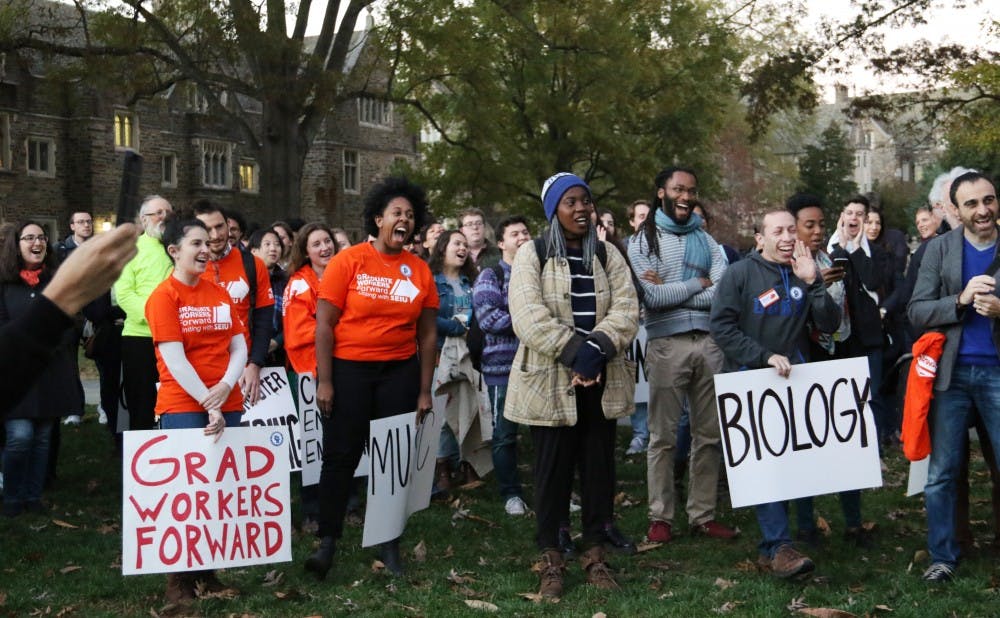As graduate students file for a union election, Duke Teaching First is making headway in its negotiations with the administration.
The Duke Graduate Students Union—which is not yet legally recognized —recently filed with the National Labor Relations Board asking the NLRB to allow a union election to proceed. Their efforts are galvanized by an NLRB decision in August explicitly stating that graduate student-workers are able to unionize—which has been a contentious legal issue historically. If the NLRB approves the group's request, and if a majority of graduate students then vote in favor of the union during the election, DGSU will gain legal status.
DGSU held a rally Thursday in front of the Allen Building to celebrate its filing, joined by members of the Duke Teaching First contingent faculty union as well as members of the Durham community. Leaders of local unions such as UE Local 150 and the People’s Alliance also took part.
Scott Barish—a fifth-year biology graduate student and member of the organizing committee—wrote in an email that DGSU currently intends to cover all graduate students laboring for the University. This includes master's students and professional students who are also getting doctorates, such as students doing both a master's in business administration and a Ph.D., he wrote.
However, such a broad classification of the "bargaining unit" could prove problematic, noted Daniel Bowling, a senior lecturing fellow in the Duke Law School. The NLRB will be looking to see if any legal technicalities prevent the union election—which he wrote in an email was unlikely—before asking Duke if it has any objections.
Duke might have an objection to make if it thinks the unit is too broad, which he explained might be the case if professional school students are involved. Bowling also noted, however, that objections carry a difficult legal burden and that the NLRB puts a lot of weight on the initial unit as described by the union.
"Depending on what positions are included in the petition, Duke could claim that the group is inappropriate for bargaining because there is no shared interest among its members," he wrote.
In response, Barish wrote that filing an objection is the University's right, and that if the University does so, DGSU will work with them to find a satisfactory arrangement.
Michael Schoenfeld, vice president for public affairs and government relations, wrote in an email that a union would actually harm graduate students.
“Duke believes that graduate students who engage in research and teaching as part of their programs of study are students, not employees, and that a union will harm, not help, their educational experience," he wrote. "Furthermore, Duke has made significant investments in recent years to increase stipends, strengthen health insurance and create new benefits for graduate students to enhance their opportunity to learn, do research, and prepare for a career."
Although Barish said specific bargaining priorities would not be decided until after the election, the date for which has not yet been decided, students shared some ideas with The Chronicle. Abhishek Chhetri, a fifth-year biochemistry graduate student, said he was looking forward to dental coverage. Friedolin Merhout—a third-year sociology graduate student—said he wanted better job security.
Chhetri added that others want concessions for graduate students who are parents or victims of abuse.
“I know some people want better support for people who have been victims of sexual assault and harassment because the Duke grievance system has failed them,” he said.
Duke Teaching First
Since their union election last Spring, the non-tenure track Duke Teaching First faculty union has been negotiating with University officials in what Matteo Gilebbi, a lecturing fellow in the romance studies department, described as a "positive" and "collegial" process.
Gilebbi told The Chronicle that one of the greatest benefits of the negotiations has been opening up the dialogue, and that DTF must remain flexible and not stick to pre-determined, uncompromising goals. He and Eileen Anderson, also a lecturing fellow in the romance studies department, said the union has reached several "tentative agreements" with the University, although a formal contract has not yet been finalized and might not be for quite some time.
The first, they said, was for all teachers to have access to laptops, photocopying services and office space, which Anderson said was not always the case currently.
"One important thing we’ve talked about with administration is keeping it a way that when students walk into a classroom, they don’t know whether it’s a contingent faculty member or not," she said.
Second, Gilebbi noted a tentative agreement to form a "labor management committee" as soon as the first contract is actually finalized. This would ensure, he said, that DTF can accommodate issues that might arise after the contract is signed.
"Duke is an institution that changes, and it changes pretty fast," he said. "The students change, the needs of students change, so we need to keep the dialogue with administration ongoing."
Get The Chronicle straight to your inbox
Sign up for our weekly newsletter. Cancel at any time.
Lastly, there is a tentative agreement to explicitly include in the contract provisions allowing faculty members to address discrimination claims and preserve academic freedom. Anderson said contingent faculty, who are hired on a semester-to-semester basis, can sometimes be wary to voice controversial opinions.
One concern from the negotiations, however, involves the freedom of speech of the DTF members, Gilebbi and Anderson said. They said the University had tried to introduce language whereby the union's members would not be allowed to protest for unrelated causes—which would have prevented them from supporting graduate students at Thursday's rally, for example.
"We would like the right to support other people, to have our voices heard," Anderson said, emphasizing how important this provision was to members of DTF.
Schoenfeld wrote in an email that the University would not comment as negotiations are in progress.
Editor's note: The Chronicle spoke with Barish by both phone and email.

